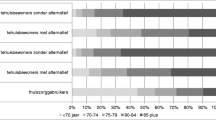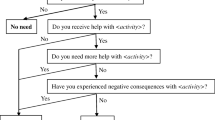Abstract
Background and aims: Sociodemographic changes affecting the elderly population and the family role in providing home care call for reorganization of formal community care services. The aim of this study was to determine the prevalence of home care needs and the factors associated with unmet home care needs among community-dwelling elderly people in Spain. Methods: The data were derived from a representative sample of community-dwelling elderly people living in a town of the metropolitan area of Madrid (N=1135). Dependency for daily, weekly and monthly activities was based on disability in activities of daily living (ADL) and instrumental activities of daily living (IADL). Insufficient help was estimated as an indicator of unmet needs. Logistic regressions were fitted to identify correlates of unmet needs for each type of activity. Results: Overall, 14, 39, and 50% of subjects reported dependency for daily, weekly and monthly activities, respectively. Of these, 40, 27, and 12% reported receiving inadequate assistance. Unmet needs were strongly associated with low monthly income, low educational level, living alone, and symptoms of depression. Families were the exclusive source of almost all assistance provided, few persons reporting the use of additional formal community care sources. Conclusions: There are considerable social and material inequalities in access to home care. In view of the poor coverage of the public system for home and personal care, these inequalities may widen in the near future. New public policy initiatives are needed to provide affordable formal family-support services.
Similar content being viewed by others
References
Stoller E, Earl L. Help with activities of everyday life: Sources of support for the non-institutionalized elderly. Gerontologist 1983; 23: 64–70.
Tennstedt S, McKinlay J, Kasten L. Unmet need among disabled elders: a problem in access to community long-term care? Soc sci Med 1994; 38: 915–24.
Branch L, Jette A. Elders’ use of informal long-term care assistance. Gerontologist 1983; 23: 51–6.
Allen S, Mor V. The prevalence and consequences of unmet need. Contrast between older and younger adults with disability. Med Care 1997; 35: 1132–48.
Desai M, Lentzner H, Dawson J. Unmet need for personal assistance with activities of daily living among older adults. Gerontologist 2001; 41: 82–8.
Guadagnoli E. Mor V. Daily living needs of cancer outpatients. J. Community Health 1991;16: 37–47.
Mor V, Allen S, Siegel K, Houts P. Determinants of need and unmet need among cancer patients residing at home. Health Serv Res 1992; 27: 337–60.
Allen S. Gender differences in spousal caregiving and unmet need for care. J Gerontol 1994; 49: S187–95.
Instituto Nacional de Estadística. Demographic projections. INE 2001. Available at www.ine.es (accessed 22 February 2002).
IMSERSO-CIS. Estudio 2079. Madrid, 1999.
Rodriguez Rodriguez P. Análisis de los recursos sociales. In Guillén Liera F, Ribera Casado JM, Eds. Geriatría XXI. Madrid: Editores Médicos, 2000; 127–60.
Guillén AM. Democracia y crisis de estado del bienestar en Espana: Procesos de reestructuración y dificultades de apoyo politico. In: Dilemas del Estado de Bienestar. Madrid: Fundación Argentaria, 1996; 321–72.
INSERSO. Plan Gerontológico. Madrid, 1993.
Directión General de Servicios Sociales de la Comunidad de Madrid. Plan de Mayores. Madrid, 1999.
Zunzunegui MV, Béland F, Llácer A, León V. Gender differences in depressive symptoms among Spanish elderly. Soc Psychiatry Psychiatr Epidemiol 1998; 33: 195–205.
Alvarado B, Zunzunegui MV, Del Ser T, Béland F. Cognitive decline is related to education and occupation in a Spanish elderly cohort. Aging Clin Exp Res 2002; 14: 132–42.
Zunzunegui MV, Béland F, Gutiérrez-Cuadra P. Losses to follow-up in a longitudinal study of older people in Spain. J Clin Epidemiol 2001; 54: 1–10.
Katz SC, Ford AB, Moskowitz RV, et al. Studies of illness in the aged. The index of ADL: A standardized measure of biologic and psychosocial function. JAMA 1963; 185: 914–9.
Lawton MP, Brody EM. Assessment of older people: Self maintaining and instrumental activities of daily living. Gerontologist 1969; 9: 179–86.
Béland F, Zunzunegui MV. El perfil de las incapacidades funcionales en las personas mayores. Revista de Gerontología 1995; 5: 232–44.
Branch L. Assessment of chronic care need and use. Gerontologist 2000; 40: 390–6.
Andersen R, Newman JF. Societal and individual determinants of medical care utilization in the United States. Milbank Q 1973; 51: 93–124.
Zunzunegui MV, Gutiérrez-Cuadra P, Béland F, Del Ser T, Wolfson C. Development of simple cognitive function measures in a community-dwelling population of elderly in Spain. Int J Geriatr Psychiatry 2000; 15: 130–40.
Radloff LS. The CES-D scale: a self-reported depression scale for research in the general population. Appl Psychol Measurement 1997; 1: 385–401.
Tomas-Aznar C, Moreno LA, German-Beás C, Alcala-Nalvaiz T, Andres-Esteban Z. Dependencia y necesidades de cuidados no cubiertas en una zona de salud de Zaragoza. Revista Española de Salud Pública 2002; 76: 215–26.
Calsyn R, Winter J. Predicting four types of service needs in older adults. Evaluation and Program Planning 2001; 24: 157–66. 27. Instituto Nacional de Estadística. Anuario Estadístico 1998. Madrid: INE, 1999.
Zunzunegui MV, Béland F, Otero A. Support from children, living arrangements, self-rated health and depressive symptoms of older people in Spain. Int J Epidemiol 2001; 30: 1090–9.
Coburn A. Bolda E. Rural elders and long-term care. West J Med 2001; 174: 209–13.
Author information
Authors and Affiliations
Corresponding author
Rights and permissions
About this article
Cite this article
Otero, Á., de Yébenes, M.J.G., Rodríguez-Laso, Á. et al. Unmet home care needs among community-dwelling elderly people in Spain. Aging Clin Exp Res 15, 234–242 (2003). https://doi.org/10.1007/BF03324504
Received:
Accepted:
Published:
Issue Date:
DOI: https://doi.org/10.1007/BF03324504




